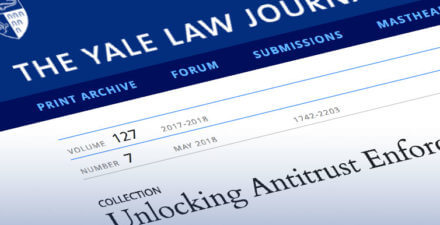An overview of recent academic literature
Overview
The decline in antitrust enforcement in the United States has been a project of conservatives for decades. Since the 1970s, the range of conduct that would be condemned by courts as anticompetitive has decreased significantly, and the evidence required to prove any particular anticompetitive harm has increased appreciably, resulting in much more freedom for business to seek profit through anticompetitive means. The conservative goal of freeing business from the constraints of antitrust law was, in theory, to obtain productivity growth that would benefit consumers through lower costs and new products. That motive—even if it characterized some of these adherents of the so-called Chicago School—has been joined, or perhaps overtaken, by support from some companies and some think tanks that want to see companies earn higher profits unconstrained by the antitrust laws. Without regard for good research or scientific evidence—as the literature review below shows—today, many continue to claim a benefit for consumers from a limited enforcement agenda.
The experiment of enforcing the antitrust laws a little bit less each year has run for 40 years, and scholars are now in a position to assess the evidence. The accompanying interactive database of research papers for the first time assembles in one place the most recent economic literature bearing on antitrust enforcement in the United States. The review is restricted to work published since the year 2000 in order to limit its size and emphasize work using the most recent data-driven empirical techniques. The papers in the interactive database are organized by enforcement topic, with each of these topics addressed in a short overview of what the literature demonstrates over the past 19 years.
The bulk of the research featured in our interactive database on these key topics in competition enforcement in the United States finds evidence of significant problems of underenforcement of antitrust law. The research that addresses economic theory qualifies or rejects assumptions long made by U.S. courts that have limited the scope of antitrust law. And the empirical work finds evidence of the exercise of undue market power in many dimensions, among them price, quality, innovation, and marketplace exclusion. Overall, the picture is one of a divergence between judicial opinions on the one hand, and the rigorous use of modern economics to advance consumer welfare on the other.
There are many great papers out there, and no doubt we missed some that we should include. This is intended to be a living collection so new research is welcomed. Please email any work that you think should be included to ThurmanArnoldYale@gmail.com and mkades@equitablegrowth.org.
Related
Explore the Equitable Growth network of experts around the country and get answers to today's most pressing questions!






